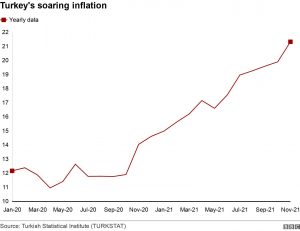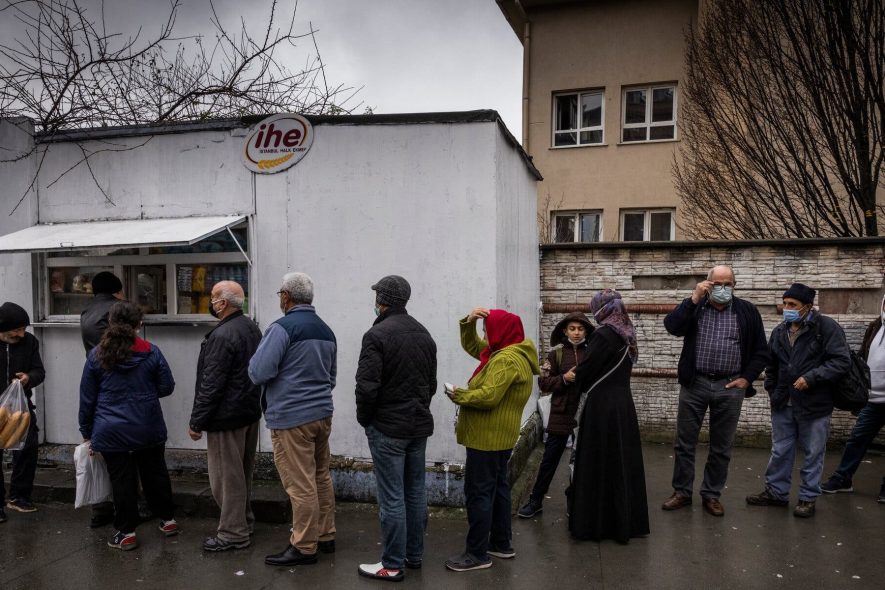In the suburb of the beautiful and historic city of Istanbul long lines are forming to buy bread – a staple of every Turk meal. There are around 1500 government-subsidized bread kiosks in Istanbul where fresh loaves of bread sell out within minutes of arrival. Often people at the end of the line go back dejected and empty-handed.
As per estimates almost 200-300 per kg of bread is consumed per person in a year in Turkey. Slices of soft baguettes are toasted and consumed with eggs, olives, cheese, and jam for breakfast. Bread is often served alongside beans or soup or sliced and for a sandwich of chicken or beef or what have you.
In short, the price of bread is the pulse of a Turkish street. And the price of bread has been rising rapidly alongside everything else in Turkey, the country reported an official estimate of eye-watering inflation of 21%, unofficially the rate of inflation is about 40%.
Inflation is a rapid rise in the prices of goods and services in an economy.
Istanbul’s official figures show that the cost of living in the city has increased more than 50 percent in a year. According to the statistics office, the price of wheat has gone up 109%, sunflower oil 137%t, toilet paper 90%, sugar 90%, and natural gas by 102%.
It is not surprising that the poor and the middle class are finding it hard to make ends meet, pay their rent, and put food on the table.
The country is in a deep currency crisis as well, the price of Lira (Turkey’s official currency) against the hard currency dollar has fallen by 50% in a year. Bankers and macro watchers say that they have rarely if ever seen this kind of volatility in the currency.
It’s mad.
For a country that has a very high current account deficit, meaning they import much more than they export, 50% depreciation in local currency means the cost of importing raw material and other goods become prohibitively high and has a direct impact on consumer goods. Take the tomato, a vital ingredient in Turkish cuisine. To grow tomatoes, producers need to buy imported fertilisers and gas. Tomato prices were up more than 75% in a year.

The country is getting increasingly impoverished with the per capita GDP which was $12600 in 2013 has fallen to $8500 in 2020. It is a very grim situation in the country with 22% of the youth unemployed. Naturally, they are dismayed and disgruntled and feel hopeless.
The sad part of all this mess is that it is completely man-made.
The country did not face any natural disasters or a calamity. Their elected President Recep Tayyip Erdogan has some madcap beliefs and is running the country to the ground.
He is following an unorthodox policy of lowering interest rates when inflation goes up. That is the complete opposite of the normal economic policies advocated and followed by Central bankers all over the world.
If inflation goes up, normally, central banks raise interest rates, reduce the supply of money in the economy (which is called tightening). When there is less money chasing goods, the demand will be lower and prices of those goods will stabilise.
He is doing the opposite. His belief, which he says is based on religion that high-interest rates cause inflation. He blames the higher prices on hoarding and has imposed price controls on goods produced by state-owned entities.
He has fired three Central Bankers and kept up the policy of reducing interest rates. Foreigners who would invest are now no longer interested as a rapidly depreciating currency eats into their return when they wish to take back dollars to their own country.
Clearly, his policies are not working.
President Erdogan’s fundamentalist religious beliefs have bought him the support of the conservatives for decades. Their economy was in difficulty but post-Covid the decline in the economy has been swift.
Normal household items are also seeing crazy price rises. It’s hard for us to understand when we haven’t faced situations like that in our lifetime. We have experienced onions at 100 Rs a kilo, which sparked angry protests in the media as well as in the parliament. Imagine prices of all the vegetables, oil, flour soap, and all normal day-to-day items doubling in months.
Impossible for citizens to manage and for no fault of their own.
Citizens are trying to keep savings in a harder currency like dollars or gold or even cryptocurrency so that the value is retained. As a lira will buy lesser tomorrow or after a few days.
A dictatorial government that suppresses dissent, divides the public while creating infights within the opposition has created the disaster.
If President Erdogan reverses some of his cuts and lets an independent Central Bank does its job, things can be reversed quickly or the public has to vote out the crackpot government and restore the country’s economy.
Interesting lessons to be learned for us where although the constitution supports a secular state, the head of the country supports the idea of a religious state and has crazy economic ideas.


Mona
Indeed an interesting lesson to be learned!!